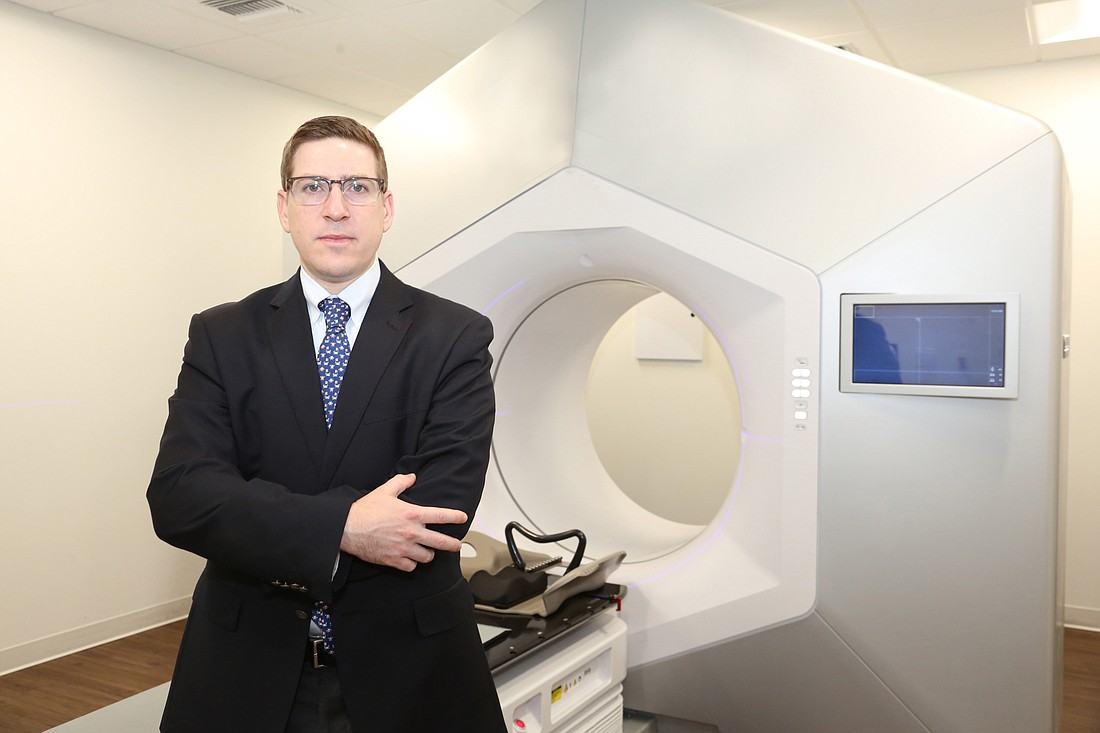- December 20, 2024
-
-
Loading

Loading

Changing the status quo doesn’t keep Dr. Arie Dosoretz up at night.
Instead, his anxiety comes from when he doesn’t believe he’s doing enough to change the core of what’s been his career focus: delivering community-based cancer care.
Dosoretz, 39, is the managing partner with Fort Myers-based Advocate Radiation Oncology, which has five locations, four in Southwest Florida and one in Tamarac, Broward County. When Dosoretz and his founding colleagues launched the practice, in late 2019, the goals were to create a medical company where top-shelf customer service is a daily must-do; decisions on equipment and personnel are based on patient need first, not cost; and a place for people to get world-class cancer treatment where they live, without driving to Tampa or Miami or flying to Houston or New York.
“There is real demand for high-level cancer care services in Southwest Florida,” Dosoretz told the Business Observer soon after the first office opened. “While that sounds simple, it’s actually quite disruptive.”
Dosoretz took a big step in the disruption path earlier this year, when he announced Advocate Radiation Oncology intends to bring a proton therapy center to the region. The state-of-the-art machine is the first of its kind on the west coast of Florida and one of only a few statewide. (Others are in Miami and Orlando.) Dosoretz declines to disclose the price for the center, which will be manufactured, installed and serviced by Belgium-based Ion Beam Applications S.A. But a practice that makes this kind of investment, he says, typically spends more than $20 million. “Proton machines are far and few between,” Dosoretz says. “People literally will fly across the country for access to a proton machine.”
A Business Observer 40 under 40 winner in 2020, Dosoretz traces his passion for change and shaking things up to when he was a kid. (He traces his passion for medicine to that too, given his father, grandfather and sister are all oncologists.) One of his heroes, outside his family, while growing up was Bob Dylan — who built a six-decade career and music and performing on constantly changing his tunes and persona. “Dylan is 20 people in one,” says Dosoretz.
While Dosoretz played guitar and sang in a rock band in high school and college, he knew medicine would be his career. But he never wanted to be ‘just’ a doctor. He wanted to mix his passion for helping others with big ideas to change how an industry operates. “I’ve always been driven to combine arts and science,” he says. “It’s interesting to me how to be creative with an area that’s very dogmatic and static.”
That’s one of the reasons why in medical school, at the University of Pennsylvania, he pursued a dual M.D./MBA degree. It was a rare move for a physician, but Dosoretz sought to understand the business side of health care like an entrepreneur. “I didn’t want (an MBA) to be just another accreditation, just a way to open doors,” he says.
'The most dangerous point about being in an echo chamber is at some point you don’t realize you are in an echo chamber.' Dr. Arie Dosoretz, Advocate Radiation Oncology
Dosoretz recalls some fellow MBA students razzing him, that he was making a mistake by focusing on health care because in most cases anyone with an advanced degree can do it. “They were all in biotechnology and they were always saying ‘if you don’t have IP to protect, then you don’t have a barrier to entry,’” says Dosoretz.
But in Dosoretz’s view, doing health care with a focus on patients, while that sounds like a simplistic bumper sticker, is, if done right, a barrier to entry. Seeing all the creative disruption at Penn — four of his classmates founded Warby Parker, now a billon-dollar eyeglass brand while in school — only drove him more to create that change in health care. “I began to think that cancer care,” he says, “really any form of health care, shouldn’t be any different.”
An important lesson Dosoretz has learned in nearly two years of helping to guide Advocate Radiation Oncology is change requires constant communication of the plan, and consistent buy-in. That goes for employees, as well as patients and their families. “Getting buy-in to the plan is one of the most important things in business,” he says. “But that’s not easily won.”
Dosoretz addresses that, in part, by making sure he has a variety of viewpoints when making big decisions. That also helps avoid groupthink. “The most dangerous point about being in an echo chamber is at some point you don’t realize you are in an echo chamber,” he says. “But when you have a diversity of opinions you can always be looking for the next best thing.”